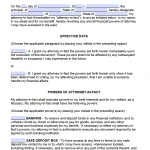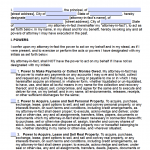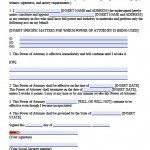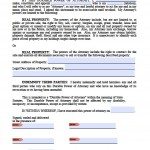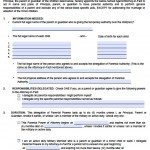Power of attorney is a legal document that allows an individual (known as the “Principal”) to select someone else (the “Agent” or “Attorney-in-Fact”) to handle their business affairs, medical responsibilities, or any decision that requires someone else to takeover an activity based on the Principal’s best interest and intentions. The form is required (depending on the State) to be signed in the presence of a Notary Public or Witness(es).
Power of Attorney Forms By State
- Alabama
- Alaska
- Arizona
- Arkansas
- California
- Colorado
- Connecticut
- Delaware
- Florida
- Georgia
- Hawaii
- Idaho
- Illinois
- Indiana
- Iowa
- Kansas
- Kentucky
- Louisiana
- Maine
- Maryland
- Massachusetts
- Michigan
- Minnesota
- Mississippi
- Missouri
- Montana
- Nebraska
- Nevada
- New Hampshire
- New Jersey
- New Mexico
- New York
- North Carolina
- North Dakota
- Ohio
- Oklahoma
- Oregon
- Pennsylvania
- Rhode Island
- South Carolina
- South Dakota
- Tennessee
- Texas
- Utah
- Vermont
- Virginia
- Washington
- West Virginia
- Wisconsin
- Wyoming
Generic Power of Attorney Forms
|
|||
|
|||
How to Get Power of Attorney?
Step 1 – Choose an Agent
Select and ask someone that you trust if they would like to be your “Agent” or “Attorney-in-Fact”. The person should be someone that you can trust and rely on to act in your best interest.
Step 2 – Select Your Form
- Durable – Financial only. Remains in-effect if the Principal becomes *incapacitated.
- General – Financial only. Does not remain in-effect if the Principal becomes *incapacitated.
- IRS (2848) – Federal tax filing with the Internal Revenue Service.
- Limited – Special activity.
- Medical – Health care decision-making only. Becomes active only when the Principal becomes *incapacitated.
- Parental – Minor’s education, health, and everyday care. Most States limit this to a maximum of one (1) year.
- Real Estate – Sale, purchase, or maintaining of property. Mostly used for real estate closings.
Step 3 – Signing Requirements
After completing, you and the Agent(s) selected will need to check the bottom of the form for the requirements for authorization. In most cases, a Notary Public will need to be used or Two (2) Witnesses.
Step 4 – Original Copies
It is important for all parties involved to have copies of their form. A power of attorney does not need to be recorded with any government office and is primarily held by the Principal and Agent(s).
Step 5 – Cancelling Power of Attorney
A Principal may terminate this arrangement by signing a Revocation Form. Otherwise it will only cancel upon the death of the Principal.
Why Have Power of Attorney?
Anyone who becomes incapacitated through an accident or illness will need to make arrangements for their affairs to be handled legally and properly. You may need to be assisted yourself, or you may be asked to assist someone else in making sure the bills are paid, banking deposits are made, and all other important medical and insurance paper work is dealt with. In both cases, a power of attorney form is a legal document that gives another person the legal authority to act as the agent or personal representative of the principal. The principal in legal matters is the person who is authorizing another to act on their behalf.
Learn about other types power of attorney including advance health care directives, financial for banking matters, for the care and custody of dependent children, and for the sale of real property including vehicles. Our extensive database of resources and links provides the direct access to the most pertinent laws, rules and regulations surrounding the steps necessary to create all types.
A power of attorney is often a highly necessary and recommended legal document. Don’t wait until you or a relative or loved one is injured or falls ill and becomes incapacitated. We will help you learn how to prepare and use these legal documents to save both you and your loved ones from the unnecessary burden and expenses that usually accompany difficult health and legal situations.

